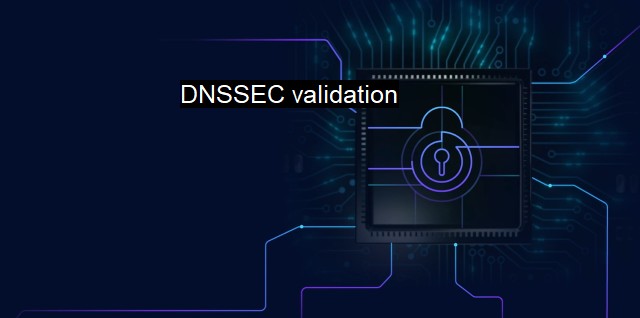What is DNSSEC validation?
Securing the Internet's Backbone: Understanding and Implementing DNSSEC Validation for Authenticated and Tamper-Free DNS Communications
Domain Name System Security Extensions, commonly known as DNSSEC, is a security protocol designed specifically to protect the Domain Name System, which is almost ubiquitous in most network communications. The context of DNSSEC validation lies in cybersecurity and antivirus measures, given its growing importance in the digital security environment.To fully comprehend the relevance of DNSSEC validation, first, it's necessary to understand the role of the Domain Name System (DNS). DNS operates like the "phone book" of the internet by resolving domain names such as "www.google.com" into IP addresses such as "172.217.0.4", which machines can easily understand. While efforts towards maintaining integrity and authenticity in this "phone book" are significant, DNS was conceptualized at a time when the security landscape and risks borne by the digital world were incrementally lower than they are today. Consequently, the original DNS protocol didn't have any measures in place to prevent malicious tampering.
Enter DNSSEC, a set of extensions to DNS, which provide authentication and data integrity to DNS responses using public key cryptography. In simplistic terms, this means DNSSEC guarantees that the website you are connecting to is actually the one you intended to reach, not a forged version created by a hacker.
DNSSEC validation is the process where the DNS resolver verifies the digital signatures in the data received with the corresponding public keys in the DNSKEY records. This guarantees that DNS data has not been altered while in transit. DNSSEC validation ensures the user gets the data exactly as the zone owner intended. Because keys participate in this verification, establishing their authenticity is important. This is achieved through a chain of trust, that begins with a trusted anchor point and proceeds towards the DNSSEC-protected domain.
Cybersecurity is a major concern in today's digital world. Attacks ranging from DNS spoofing, phishing, or distributed denial-of-service (DDoS) can cripple a network, distort information flow, or capture confidential data. DNSSEC aims to provide a stable, authenticated, and more secure internet by ensuring that users are not misdirected by fraudulent DNS entries. It plugs the vulnerability within DNS by offering a means of checking if the responses from a DNS server are authentic and unaltered.
Although DNSSEC validation doesn't offer complete protection and is vulnerable to attacks such as DDoS, it does provide a sturdy line of defense against attacks aimed at exploiting the DNS's integral architecture. Phishing attacks, which serve malware and demand ransom, or attacks that redirect users to malicious sites, are ameliorated by DNSSEC.
Validation also plays a complementary role to antivirus software. Antivirus software, which is generally the first line of defense, isn't infallible. It may fail to detect new or advanced threats. DNSSEC contributes by preventing spoofing attacks directed towards the DNS infrastructure and reducing the chances of malware infiltration.
Therefore, DNSSEC validation operates on multiple fronts, aiding in efforts against spoofing, server tampering, and deterring malicious attacks against DNS. It is an integral part of an effective cybersecurity strategy.
Though deploying DNSSEC can be complex and challenging, its adoption is growing given the surge in cyber threats. It is a robust solution, upping the ante against cybersecurity threats and shoring up the trust that users place in the digital world.
DNSSEC validation is a crucial procedure in the digital security environment, complementary to antivirus software. The reliable and secure internet we often take for granted is due, in part, to security measures such as DNSSEC. While DNSSEC cannot solely stand guard against all kinds of threats, it certainly forms a vital part of the broader security mechanism, dapperly ensuring the integrity and authenticity of the internet world.

DNSSEC validation FAQs
What is DNSSEC validation?
DNSSEC validation is a process that verifies the authenticity of DNS data using cryptographic keys. This validation ensures that the requested website is genuine and not modified or impersonated by an attacker.Why is DNSSEC validation important for cybersecurity?
DNSSEC helps to prevent DNS spoofing, which is a common tactic used by cyber attackers to redirect users to fake websites for phishing or malware distribution. DNSSEC validation ensures that the DNS data is accurate and the requested website is authentic, protecting users from cyber threats.How does antivirus software utilize DNSSEC validation?
Antivirus software can use DNSSEC validation to check the authenticity of the domains and IP addresses that are accessed by the user. By validating the DNS data, antivirus software can block access to malicious websites that could infect the user's device with malware.What is the difference between DNSSEC validation and SSL/TLS encryption?
DNSSEC validation verifies the authenticity of DNS data during the domain resolution process, while SSL/TLS encrypts the data exchanged between the user's device and the website server. DNSSEC helps to prevent DNS spoofing attacks, while SSL/TLS protects the data sent over the internet from interception and eavesdropping. Both mechanisms work together to enhance cybersecurity.| | A | | | B | | | C | | | D | | | E | | | F | | | G | | | H | | | I | | | J | | | K | | | L | | | M | |
| | N | | | O | | | P | | | Q | | | R | | | S | | | T | | | U | | | V | | | W | | | X | | | Y | | | Z | |
| | 1 | | | 2 | | | 3 | | | 4 | | | 7 | | | 8 | | |||||||